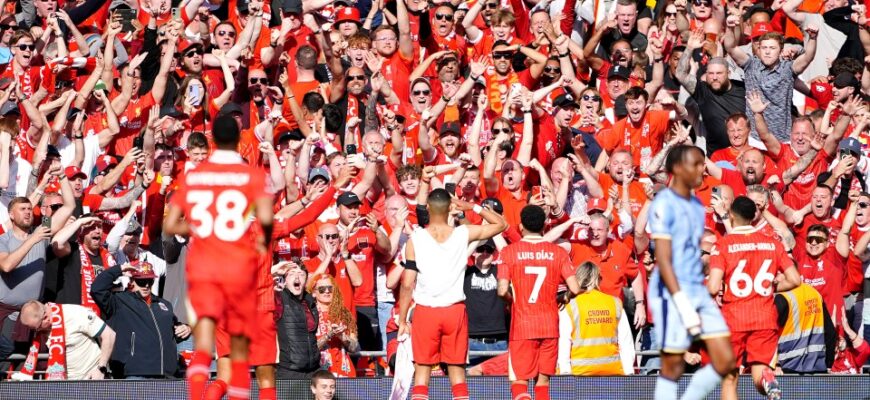Securing the Premier League title months after establishing a significant lead, Liverpool were officially confirmed as champions on Sunday. This achievement, following a 5-1 victory over Tottenham Hotspur, marks an impressive debut season for manager Arne Slot.
In the final stretch of their title campaign, Liverpool maintained a comfortable pace, navigating minor challenges thanks to the substantial advantage built earlier in the season. While this made the conclusion of the title race somewhat predictable, their initial ascent to the top was far from guaranteed at the season`s outset.
The speed at which Liverpool would adapt post-Jurgen Klopp was initially uncertain. Klopp`s tenure spanned nearly nine years, marked by significant success including a Premier League title, a Champions League trophy, and two other European final appearances. However, Slot quickly found his stride at Anfield, suffering only one defeat across all competitions before early January. The Dutch coach, previously only managing in the Netherlands, evolved Klopp`s famously attacking side into a team demonstrating more tactical control while still delivering peak performance results. Their dominant start provided a crucial buffer, helping them weather later season difficulties and ensuring silverware despite exiting the FA Cup and Champions League, and losing the EFL Cup final within a short winter period.
As celebrations commence on Merseyside, let`s review the pivotal factors that shaped the Reds` title-winning campaign and guaranteed success in Slot`s inaugural season at Anfield.
Mohamed Salah`s Exceptional Form
The unexpected dominance of Liverpool`s title run was partly due to the initial sense of it being a transitional year. Limited activity in the transfer market meant Slot inherited a squad largely assembled for Klopp, potentially slowing his implementation of new tactics. Adding to this uncertainty was the contract situation of veterans Mohamed Salah and Virgil van Dijk, both entering the final year of their deals and facing potential departures, despite being crucial figures for the new era.
However, the boundary between periods of transition is often hard to foresee. Liverpool`s decision to trust that Salah still had a peak year left proved astute. A defining feature of the title win was arguably the finest six months of Salah`s distinguished career. During this spell, the 32-year-old scored with remarkable regularity. His current season tally stands at 33 goals and 33 assists across all competitions, with the bulk occurring between August and February. Salah`s performance mirrored the team`s; his dip in form in the spring coincided with Liverpool`s tougher patch, but his exceptional early contributions had already secured their title position.
This remarkable run earned Salah a new two-year contract at Anfield and propelled him into contention for the Ballon d`Or, further enhancing an already impressive legacy. Whether he can sustain this level for another two years remains to be seen, but even if his influence eventually lessens, this individual performance stands out as a potentially career-defining peak.
Manchester City`s Unexpected Struggles
Another factor making Liverpool`s triumph somewhat unexpected was the widespread belief that Manchester City, fresh off a four-year winning streak, were the clear favorites to secure the title once again. While questions about their sustained motivation existed, few predicted the significant decline in form they experienced this season.
Initially affected by Rodri`s injury in September, a series of poor results in the autumn demonstrated deeper issues than a single player`s absence. Pep Guardiola conceded they were out of the title race before the New Year, stating there was `no chance` they could catch Liverpool, who held a 14-point lead by late December. This proved accurate; City finished the season vying for a Champions League spot, an objective not entirely secured in a highly competitive league partially influenced by their own dip.
City`s struggles occurred in a season where many top Premier League teams also faced difficulties. Arsenal, likely securing a third consecutive second place, showed consistency but never mounted a serious title challenge against Liverpool. Chelsea, under new manager Enzo Maresca, truly experienced a transitional year. Meanwhile, Manchester United and Tottenham Hotspur endured unusually poor campaigns, finishing in the lower half of the table. In essence, Liverpool were the only side consistently performing at a title-challenging level, making them deserving champions.
Arne Slot`s Immediate Impact
If the season began under a cloud of uncertainty, Arne Slot embodied it. While his success at Feyenoord, including winning the Eredivisie and KNVB Cup, had marked him as a promising young European manager, an adjustment period to the Premier League was anticipated. Liverpool`s relatively quiet transfer window further suggested that immediate radical tactical changes were unlikely.
Nevertheless, the new manager made an immediate impact, quickly demonstrating his style even with a squad still shaped by Klopp`s legacy. Slot rapidly implemented a more pragmatic approach, maintaining results despite his team averaging fewer shots than the previous season. Their attacking effectiveness remained comparable during the first half of the campaign. Even facing tougher challenges in the latter part of the season, Slot unequivocally proved his capability among elite European coaches, potentially becoming the first of a new generation to successfully transition to a top English club.
Slot will face new challenges next season; the difficulties encountered this campaign highlight areas where Liverpool could benefit from squad reinforcement, accelerating the evolution from the Klopp era to the Slot era. How this new phase ultimately unfolds is a significant question, making the Reds a compelling team to observe in the coming years.









